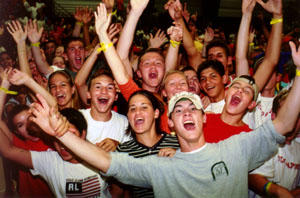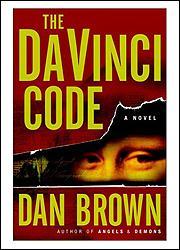 (Thirteenth Sunday of the Year (C): This homily was given on June 27, 2004 at St. Pius X Church, Westerly, R.I. Read Galatians 5: 1.)
(Thirteenth Sunday of the Year (C): This homily was given on June 27, 2004 at St. Pius X Church, Westerly, R.I. Read Galatians 5: 1.)[For the audio version of this homily, click here: Thirteenth Sunday 2004]
Galatians 5:1—the first line of our second reading today—was the theme verse of the Steubenville High School Youth Conference two years ago. Those who attended should remember it, since it was quoted over and over again by the people who gave the talks: “For freedom Christ set us free; so stand firm and do not submit again to the yoke of slavery.”
So have you? If you’re a teenager or a young adult—or a chaperone—who attended that conference, have you stood firm in your Catholic Christian faith? Have you been a good role model for your peers? Have you led others to Christ?
Or have you slipped back into your old sinful habits?
“For freedom Christ set us free.” Here in the United States many people think of freedom primarily in political or economic terms. Their reasoning process goes something like this: Our country is a representative republic; we have a democratic form of government. We can buy and sell products all over the world; we can openly share our ideas; we can own private property—thus we are free. Those who live in places around the world where rights like these are denied are not free.
That’s their point of view, and it certainly has some validity. But St. Paul reminds us in Galatians 5:1 that this political/economic understanding of freedom is much too simplistic and superficial. For St. Paul, freedom was—first and foremost—a spiritual issue, a matter “of the soul.”
Listen to this passage from the Catechism, paragraph 1731: “God created man a rational being, conferring on him the dignity of a person who can initiate and control his own actions. ‘God willed that man should be ‘left in the hand of his own counsel,’ so that he might of his own accord seek his Creator and freely attain his full and blessed perfection by cleaving to him.’”
The Catechism is reminding us here that freedom can either be used or abused. If it’s used properly, it perfects us as persons and brings us one step closer to heaven, the final goal of human existence. If it’s abused, on the other hand, it corrupts us, leads us into a kind of slavery, and puts us on the fast track to “the other place.”
Let me give you a contemporary example of the latter, a contemporary example of freedom being abused. A man I know is presently involved in an adulterous relationship. It’s been going on for well over a year. He knows he should end it; every once in a while he talks about ending it. But it’s gone on for so long at this point that part of him does not want to terminate the affair. Does his conscience bother him at all? Of course, it does. That’s why he’s also become a heavy drinker! The alcohol helps him disregard the messages his conscience is continually giving him.
Economically and politically, this man is free—completely free! He can own property; he can buy and sell legitimate products on the open market; he can speak his mind in public. But deep down inside (where it really counts), he’s a slave: he’s a slave to lust, a slave to drink, a slave to a lifestyle that’s destroying him emotionally, spiritually, and even physically!
And the interesting thing is, many years ago this man had a genuine conversion experience, and afterward practiced his Catholicism faithfully—until he made the choice to turn away, and the choice to go on living in sin, the choice not to repent. Perhaps St. Paul had someone like this man in mind when he wrote Galatians 5:1: “For freedom Christ set us free; so stand firm and do not submit again to the yoke of slavery.”
This year’s Steubenville Youth Conference will have another theme verse from Sacred Scripture. But Galatians 5:1 could actually be the theme verse every year, because it’s the message God always has at the end of the weekend for those who make a personal commitment to Christ and his Church: “Christ has set you free at this conference; so stand firm and do not submit again to the yoke of slavery! Don’t go back to your former way of living!”
This is also the message God has for us every time we exit the reconciliation room after making a good confession and receiving absolution!—“I’ve freed you from your sins; now go forth and stay free!”
And the good news is, we can stay free—by the grace of God—if we use our freedom properly and choose to!

